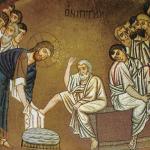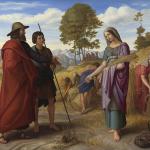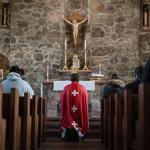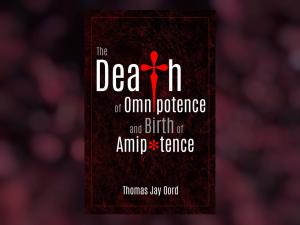
In his book The Death of Omnipotence and Birth of Amipotence (SacraSage, 2023), theologian Thomas Jay Oord argues the traditional assumption that God is all-powerful is neither biblical nor logically coherent, and is incompatible with human freedom as well as the existence of evil and suffering. He proposes a new understanding of God as “amipotent,” or powered by love.
While these are bold ideas, Oord writes that, more importantly, this shift “accounts for what’s loving, true, good, and beautiful in creation without making God responsible for the evil, ugly, and bad. And it provides hope for the victory of good over evil now and in the future.”
Lost in (Mis)Translation
The Death of Omnipotence and Birth of Amipotence wisely begins by examining scripture passages that are often cited to support a theology that God is all-powerful. Balancing detail with simple, bold conclusions, these pages offer readers an easily digestible yet comprehensive investigation into words and terms translated as ”almighty” or “omnipotent” that many probably find familiar but had likely never studied before.
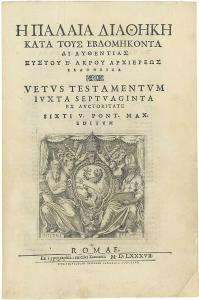
The conclusions we must make defy debate: Omnipotence is a concept that did not even occur to the original writers of the Old Testament, and is not even a Jewish idea. The translators of the Septuagint, an ancient Greek translation of Hebrew scripture, actually made up a new word (pantokrator, or παντοκράτωρ) to characterize the meaning of the terms in question, and subsequent Latin and English translations of that word were mistranslated.
New Testament writers did not consider God to be omnipotent, and Jesus never called God “almighty” or “omnipotent.” The words often translated in English as omnipotent or almighty either are used in a different context or are direct quotations from the mistranslated Septuagint.
Additionally, there are no biblical phrases or descriptions of God that are any collective sort of equivalent to omnipotent, but there are multiple passages of scripture that state what God cannot do quite unambiguously.
God Can’t
Oord advances his thesis by providing a list of examples of what God can’t do. Every step of the way, he is careful to point out what is and is not actually stated in the scriptural text.
Several of Oord’s examples are statements directly attributed to God in scripture. What is not present in scripture are any examples of God controlling anyone. By exploring ontological contradictions, Oord simultaneously highlights biblical evidence that God does not act singlehandedly but works relationally alongside creatures.
Many of the contradictions he lists are so ridiculous, it is surprising that some attempt to qualify God’s power in such a preposterous way. For example:
- God cannot create someone more loving than God.
- God cannot be omnipresent and absent somewhere.
- God cannot make a mountain so high God cannot climb it.
Oord puts it this way: “Qualified omnipotence is an oxymoron.” Therefore, if omnipotence must be qualified, it cannot be omnipotence.
The Nail in the Coffin
Though Einstein’s theory of relativity may account for the unfolding entropy of our existence, there remain aspects of life that have positive or “good” qualities, and certainly there is bad.
For some, an omnipotent God makes them feel better about bad or even evil things that happen around them. The concept is simple: bad stuff may happen, but God is in control. For example:
- Waring parties may kill children, but God is in control? Really?
- Hitler exterminated six million Jewish lives in the Holocaust, but God is in control?
- My loved one suffered horrible pain as cancer took her life, but God is in control?

The concept of omnipotence suggests that God is responsible for evil, and unfortunately, there are well-respected church leaders who endorse and promote this fallacy.
Christianity has long grappled with Theodicy, or the problem of evil: If God is all-loving and all-powerful, why does evil and suffering exist in the world?
It’s a valid question that has provoked many to leave their faith behind.
Others misplace their faith in God by applying a theology of omnipotence to political leaders and asserting that God has divinely appointed them. And it is easy to embrace such delusions when secular institutions imitate omnipotence. Particularly in the United States, political and governmental systems centralize all authority and assume all responsibility to decide what is “the greater good.”
So, the state is omnipotence made in our own image.
Many Christians witness the evil and corruption that suffuses every institution (even some churches), and despair because of their faith in an omnipotent rescuer. Or perhaps when considering sickness and disease, some Christians become despondent because an omnipotent god can heal every illness, but for reasons beyond our comprehension, doesn’t.
The real problem isn’t evil, or even that bad things happen: it is an idolatrization of omnipotence.
Oord suggests a six-point process theology to remedy this. Even more important, his solution can provide freedom for so many who blame God for seemingly not acting on behalf of those who suffer.
The best part is that each element of his proposal is relational:
“If we detach the traditional answers to evil from the idea that God has unlimited power, we can salvage most of them. The God who emerges better fits scripture, philosophy, and everyday experience. And we can resolve a host of troubling issues that leave many to doubt a loving God exists.”
A New Word for a New Perspective of God
In the vacuum left by the death of omnipotence, how should we conceive of the power God has?
Amipotence is a word created by Oord compounding two Latin words that mean “love” and “power” respectively. By prioritizing love over power, he suggests that the only way we can ever begin to comprehend God’s power is by first accepting his love.
Many writers and theologians from antiquity though today write of love, but fail to put love first because of their dependence upon an omnipotent God.
Oord’s definition is simple: “Amipotence is maximal divine power in the service of love.”
By defining God’s power solely within the context of love, should we change how we think about God?
Why should God’s actions seem mysterious if his singular motive is not? What if God acted in a way that is similar to us? If we can ourselves act in love, then we can empathize with God’s motives.
Oord suggests that without similarities to God, we have no bearing to understand him at all, and without differences, we are unable to distinguish the creator from his creation.

Amipotence provides a solution to other ontological issues. Though God’s Spirit may be invisible, when we feel the Spirit, we feel the love of God at work. What’s more, the power of God’s love results in the visible actions of the Spirit working alongside creation in the world universally.
That means there is nothing created that cannot be influenced by God’s love. It is a universal power. In contrast, no other single creature has influence over everything.
Oord lists eight elements of Amipotence, and as with his solution to Theodicy, each proposal is relational. Bottom line: God loves totally and completely, therefore his love is manifested by the Spirit who acts universally alongside all creatures.
We should learn so much. In love, nothing is without relationship. Our very lives can be powerful expressions of God’s love when we seek relationship with him and all creation.
Final Review
This is a book you must read.
Too many people you know struggle with hearing of an all-powerful God who claims to love while so much in the world is senseless and broken. Pain and suffering can at times make better teachers than even the most dynamic of theologians, unfortunately. That is why this book is so very needed: for those who are willing to serve as the hands and feet of Jesus and in cooperation with the Spirit offer love and hope through loving relationships with others.

Some would say that to suggest “God is not all powerful” is too big a pill to swallow, but by accounting for every noun and conceivable ontological argument, Oord successfully eats the elephant one bite at a time.
There are parts I wanted to read more about, and others that were covered exhaustively. For example, his section on El Shaddai states what is necessary and correct to unquestionably support his argument that pantokrator is a bad translation, while a slightly fuller picture of possible Shaddai meanings could have found textual connection with his later comparative ontological descriptions of the Spirit such as “breath.” Nevertheless, his insights are consistently creative and grounded, with nothing lacking.
Though not a long read, The Death of Omnipotence and Birth of Amipotence is deeply engrossing. The style is never pedantic and remarkably accessible, yet filled to the brim with supportive research, documentation, footnotes, and a helpful index. Oord is gifted at distilling complex notions into simple language and metaphor, and it is exhilarating to observe his style evolve over the decades from tentative and propositional to frank and authoritative, while always loving.
This book should inspire many to continue the conversation. More importantly, I hope it will encourage you to affirm God’s transformational love through relationship with the Spirit and all creation.



